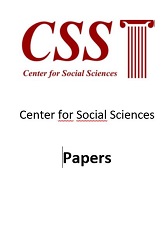The Youth Discourses on EU-ropeanization in the New European Countries and the Margins of Europe
The Youth Discourses on EU-ropeanization in the New European Countries and the Margins of Europe
Author(s): Lia Tsuladze
Subject(s): Sociology of Culture, EU-Approach / EU-Accession / EU-Development, Identity of Collectives
Published by: CSS - Center for Social Sciences
Keywords: EUropeanization; youth; discourse; stigmatization; ambivalent identities;
Summary/Abstract: In the following paper I discuss the perception of EU-ropeanization among the youth from the new European countries (the cases of Romania and Poland) and the margins of Europe (the case of Georgia). Based on my recent cross-cultural qualitative research, namely, the in-depth interviews and focus group discussions with Georgian, Romanian and Polish youth, I aim to illustrate how the EU-ropeanization discourses uphold the ambivalent identities promoting the construction of certain reality, in which the young people constantly negotiate between the EU-ropeanizing forces and the national. The abovementioned ambivalence is reflected in the youth narratives on the impact of the EU normative standards on their societies that tend to both regulate and confuse everyday life and of the EU-ropeanizing trends on the local traditions that tend to both encourage inventing “specificity”and endanger traditional practices. The positive outcomes of the EU integration as seen by the youth from the new European countries are both the ease of crossing the borders with new opportunities to study and work and the EU projects supporting the development of local economies and infrastructure. However, they stress that both the former and the latter have their side effects as the implementation of certain EU regulations might represent a mere performance/spectacle, while crossing the borders might produce a nation-wide “failure discourse” as a result of negative stigmatization by a recipient society. The discourses of the youth from the margins of Europe being willing to join the EU (Georgia) do resonate with the ones of their counterparts from the new European countries (Romania and Poland).
Series: CSS - Working Papers
- Page Count: 10
- Publication Year: 2012
- Language: English
- Content File-PDF

